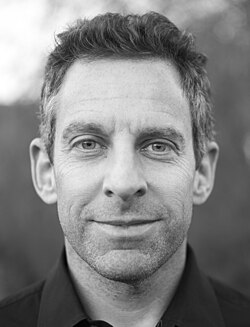Sam Harris Quote
As you know, the public conversation about the connection between Islamic ideology and Muslim intolerance and violence has been stifled by political correctness. In the West, there is now a large industry of apology and obfuscation designed, it would seem, to protect Muslims from having to grapple with the kinds of facts we’ve been talking about. The humanities and social science departments of every university are filled with scholars and pseudo-scholars—deemed to be experts in terrorism, religion, Islamic jurisprudence, anthropology, political science, and other fields—who claim that Muslim extremism is never what it seems. These experts insist that we can never take Islamists and jihadists at their word and that none of their declarations about God, paradise, martyrdom, and the evils of apostasy have anything to do with their real motivations.
As you know, the public conversation about the connection between Islamic ideology and Muslim intolerance and violence has been stifled by political correctness. In the West, there is now a large industry of apology and obfuscation designed, it would seem, to protect Muslims from having to grapple with the kinds of facts we’ve been talking about. The humanities and social science departments of every university are filled with scholars and pseudo-scholars—deemed to be experts in terrorism, religion, Islamic jurisprudence, anthropology, political science, and other fields—who claim that Muslim extremism is never what it seems. These experts insist that we can never take Islamists and jihadists at their word and that none of their declarations about God, paradise, martyrdom, and the evils of apostasy have anything to do with their real motivations.
Related Quotes
People lack morals, good moral character is important in every aspect of your life. Honesty and Integrity opens the door. Your character allows others to see you for who you truly are. Make your first...
About Sam Harris
Harris's first book, The End of Faith (2004), won the PEN/Martha Albrand Award for First Nonfiction and remained on The New York Times Best Seller list for 33 weeks. Harris has since written six additional books: Letter to a Christian Nation in 2006, The Moral Landscape: How Science Can Determine Human Values in 2010, the long-form essay Lying in 2011, the short book Free Will in 2012, Waking Up: A Guide to Spirituality Without Religion in 2014, and (with British writer Maajid Nawaz) Islam and the Future of Tolerance: A Dialogue in 2015. Harris's work has been translated into over 20 languages. Some critics have argued that Harris's writings are Islamophobic. Harris and his supporters reject this characterization, saying that such a labeling is an attempt to silence criticism.
Harris has debated with many prominent figures on the topics of God or religion, including William Lane Craig, Jordan Peterson, Rick Warren, Robert Wright, Andrew Sullivan, Cenk Uygur, Reza Aslan, David Wolpe, Deepak Chopra, Ben Shapiro, and Peter Singer. Since September 2013, Harris has hosted the Making Sense podcast (originally titled Waking Up), which has a large listenership. Around 2018, he was described as one of the marginalized "renegade" intellectuals, though Harris disagreed with that characterization. In September 2018, Harris released a meditation app, Waking Up with Sam Harris. He is also considered a prominent figure in the Mindfulness movement, promoting meditation practices without the need for any religious beliefs.
